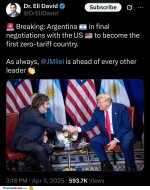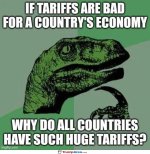Scott
Verified User
I really liked Glen Diesen's article, as it helped my understand the new American tariffs. I had heard that tariffs -can- be good, but I also now feel that the U.S. has gone overboard- Diesen's article confirms this. I think the last 2 paragraph from his article sums up his point:
**
The repatriation of supply chains will take decades. To ensure tariffs are temporary, there needs to be economic activity to enhance maturity and competitiveness – such as technological development, vigorous industrial policies and infrastructure investments. This has not been done in the US as the financialization of the economy and the oligarchy have created excessive rent-seeking. The economic war against China has made matters worse, as banning the export of advanced semiconductors has resulted in the loss of huge market shares, diminishing available funds for research and development. Lastly, the excessive use of tariffs breaks the multilateral rules agreed upon by the World Trade Organization, and other countries will retaliate.
Temporary and moderate tariffs can be a reasonable instrument to enhance competitiveness, yet they come with significant risks. The US insistence on dominating and preventing the rise of China, rather than accepting a new international division of labour between equal great powers, has resulted in the tariff instrument being used too aggressively and thus, making the US destined to fail.
**
Full article:

 glenndiesen.substack.com
glenndiesen.substack.com
**
The repatriation of supply chains will take decades. To ensure tariffs are temporary, there needs to be economic activity to enhance maturity and competitiveness – such as technological development, vigorous industrial policies and infrastructure investments. This has not been done in the US as the financialization of the economy and the oligarchy have created excessive rent-seeking. The economic war against China has made matters worse, as banning the export of advanced semiconductors has resulted in the loss of huge market shares, diminishing available funds for research and development. Lastly, the excessive use of tariffs breaks the multilateral rules agreed upon by the World Trade Organization, and other countries will retaliate.
Temporary and moderate tariffs can be a reasonable instrument to enhance competitiveness, yet they come with significant risks. The US insistence on dominating and preventing the rise of China, rather than accepting a new international division of labour between equal great powers, has resulted in the tariff instrument being used too aggressively and thus, making the US destined to fail.
**
Full article:

American tariffs and the return to 'fair trade'
Prof. Glenn Diesen / op-ed in CGTN






